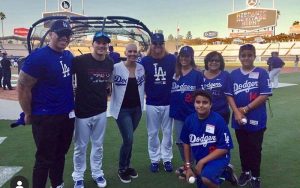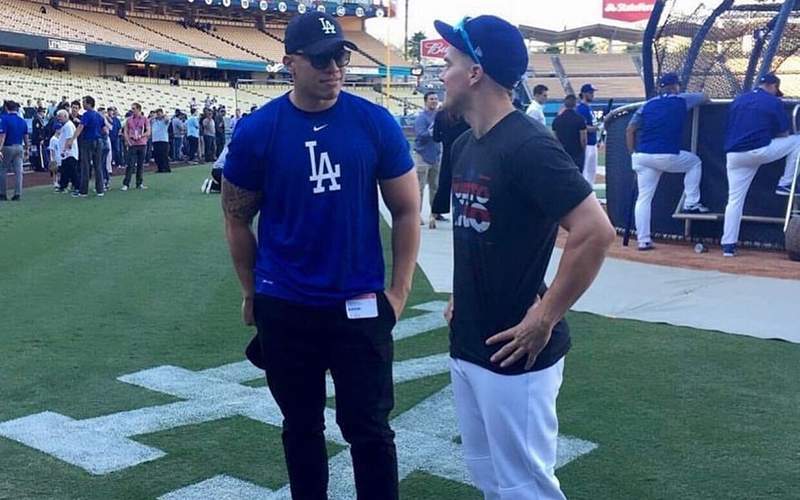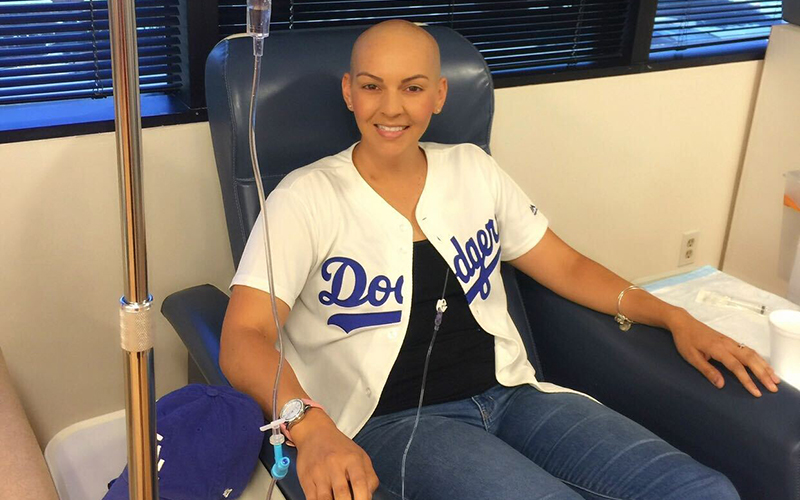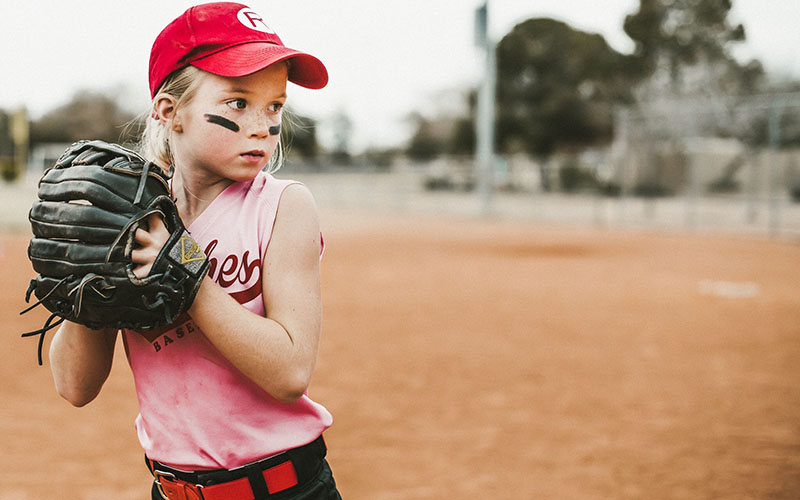PEORIA – To many people, professional sports are simply entertainment. They provide an arena for athletes to play the games we played as kids.
For others, they are so much more. They are inspiring. They are an escape from difficult times. The are a forum for athletes who have the capability to impact lives with simple conversations.
Peoria resident Jessie Letuli finds truth in all these things. In December of 2016, she was diagnosed with breast cancer.
The Los Angeles Dodgers helped her get through it.
“As I went to the military, there were so many different fans of different sports, and I just started to be that die-hard Dodger fan,” Letuli said about her five years in the Navy as an air traffic controller.
After months of radiation and chemotherapy, the Dodgers were a healing force behind her fight. Letuli would wear her Dodger jerseys to chemotherapy because of the way the jerseys made her feel.
“I would tell my husband, ‘look good, feel good,’ and I always felt like I looked good and I felt good in my Dodger jersey,” she said.
Several studies have found that identification with a sports team can help with psychological health. Daniel Wann, PhD, a psychology professor at Murray State University in Kentucky, reported in a 2006 study that there is a positive benefit to making a connection with a team.
The success the Dodgers had on the field helped Jessie find success off it. They won 104 games in 2017 and their effort inspired her.
“It was a great distraction but at the same time, it just made me feel good, too, of what kind of season we were having. So I just lived off that energy,” she said.

After the Los Angeles Dodgers learned of her breast cancer diagnosis, Jessie Letuli was invited to spent time on the field watching batting practice before a game. (Photo courtesy of Jessie Letuli)
The team became an even bigger force in her fight when a Dodger Stadium employee reached out to her via social media and offered an on-field experience for a game in late September of 2017. It included six tickets to the game, a gift bag and the opportunity to go on the field for batting practice.
One of the many Dodgers she and her family met was utility player Kiké Hernández, whose father had battled cancer. He was able to relate to the Letuli family’s experience and sought out Jessie’s husband, Tony, to share his experience.
“Yeah he said f— cancer,” Tony said while laughing, “I didn’t feel like anyone knew what I was going though, but I knew he did.”
Hernandez made Tony realize that he was not alone, and that other people shared a similar journey, even the icons he sees on the field.
Alanna Rizzo, who worked as the on-field reporter for the Dodgers from 2013-2020, said she would often see players interact with guests at the ballpark.
“They are people first before they are players,” she said, “They understand that they have a responsibility and a platform.”
And they understand the healing power of sport.
“To me, the fact that they came over and spent time with me speaks volumes of the culture of baseball. I’ve always seen these guys as role models,” Jessie said. “That’s just what Dodger baseball is all about.”
Rizzo saw this firsthand during her eight years with the team.
“The Dodgers are incredible in welcoming the community and their fan base into the stadium,” she said. “At home games we always had hundreds of people on the field watching batting practice. The Dodgers are very good at embracing the community.”
As the Dodgers rolled through the playoffs en route to their first National League pennant in over 30 years, the fans felt the hope, and Jessie found the motivation to fight harder against her cancer.
“I thought, if I can beat cancer, the Dodgers can win this World Series.”
Although the Dodgers lost in the championship series, Jessie felt like a winner when she learned she was in remission in December 2017, right before she and her husband moved to Arizona.
She took advantage of living in the state by attending spring training games and watching the Dodgers play the Diamondbacks at Chase Field, but in November of 2019, she felt another lump in her right breast and worried the cancer had returned. Despite receiving a normal MRI in May of 2020, she was concerned.
As if 2020 wasn’t difficult enough with the pandemic, Jessie was also dealing with the lingering thought that her cancer was back. As always, the Dodgers were there to help ease her mind.
That season was a special one for Jessie and the Dodgers. It wasn’t just watching the games that made her feel better, it was the ability to watch the team win the World Series for the first time in her life.
“I was crying like a big baby. I felt like I won the World Series, that’s how much it meant to us,” she said.
Jessie encouraged Tony to become a die-hard Dodgers fan, and the power of sports has impacted him, too.
“What I like about sports is seeing the improbable,” he said. “Like seeing underdogs overcome things that you didn’t think were possible. I think that helps people to know that there’s fight in them.”
In a year filled with challenges, the seemingly impossible happened, as Jessie received confirmation in November that her cancer had returned. Although the Dodgers weren’t an underdog, Jessie was, and she would have to start her second fight against breast cancer.
Shortly after experiencing the euphoria of winning a title, she quickly underwent two surgeries and began radiation. Her treatment is going well so far, she said, and once again, she has Dodgers baseball to help her out.
To Jessie, the Dodgers aren’t just players. They aren’t just any team or organization. They are her teammates, and she feels a part of the organization through the wins and losses. Her relationship with the Dodgers gave her hope, energy and positive light in her darkest times and during her hardest fights.
“(Sports) are a way of life,” Jessie said, “It gives everyone hope, it’s challenging and it shapes you.”


